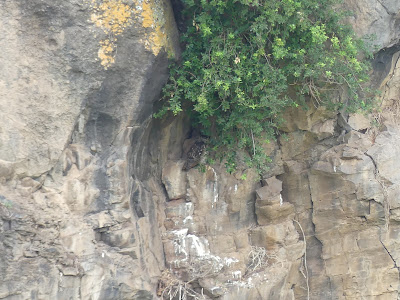Rufous-naped Lark
Galla Oryx
Then we headed north for Marsabit. It was an extremely long drive, punctuated by brief stops on the road for specific species. The key reason for the northward jaunt was the Masked Lark that is found in the lava fields. On the 9th we not only found the lark but also a nest with two eggs in it.
Masked Lark
Other stop offs produced Bare-eyed Thrush, Heuglin's Bustard, Somali Fiscal and Somali Sparrow, but tere was no sign of African Scissor-tailed Kite anywhere. Strange for such a large, obvious bird.
African Bare-eyed Thrush
Black-chested Snake Eagle
White-crowned Starling
Towards the end of the day, there was a really heavy downpour. There was hail too, extremely unusual for Kenya.
Greater Kestrel
As we started the transfer to Naro Moru we came across a hub of activity just off the road. The rain and ensuing heat had caused the mound to emit winged termites and birds had noticed and were snatching them from the air and off the ground.
Golden-breasted Starling
Wattled Starling
After birding around the grounds of Naro Moru we had found that the rain was again causing us to miss species. Where we expected to see sunbirds, some birds were not present - perhaps due to so many blooms having been knocked from the bushes.
Nakuru, like all the lakes in the rift valley had quite a large area of flooded forest where water levels have risen and drowned waterside trees. This is not due to increased rain however. The scientific theory is that although the African Rift Valley sits on a divergent plate boundary ( the Somali and Nubian plates are currently pulling apart at some 6 to 7 mm annually), other earth movements over the last 10 years or so have caused the lake beds to rise and displace water.
Increased water levels not only drown lakeside trees, but have also rendered one of the park entrances useless.
Lesser & Greater Flamingoes on Lake Nakuru
At the Lake Baringo conservation area we had some specific areas where scarce species had been seen. Our guide enlisted the aid of a local man who had tracked down Slender-tailed Nightjar and two roosting owls.
Ethiopian Swallow
Mackinder's Eagle-Owl at a long established roost site near Nairutia.
Black-faced Vervet
Long-crested Eagle
Cliff Chat
Pearl-spotted Owlet
Slender-tailed Nightjar
Nubian Woodpecker
African Wood Owl
Northern White-faced Scops Owl
Three-banded Courser
Northern Crombec
Boathouse and trees, now inundated by Lake Baringo


























